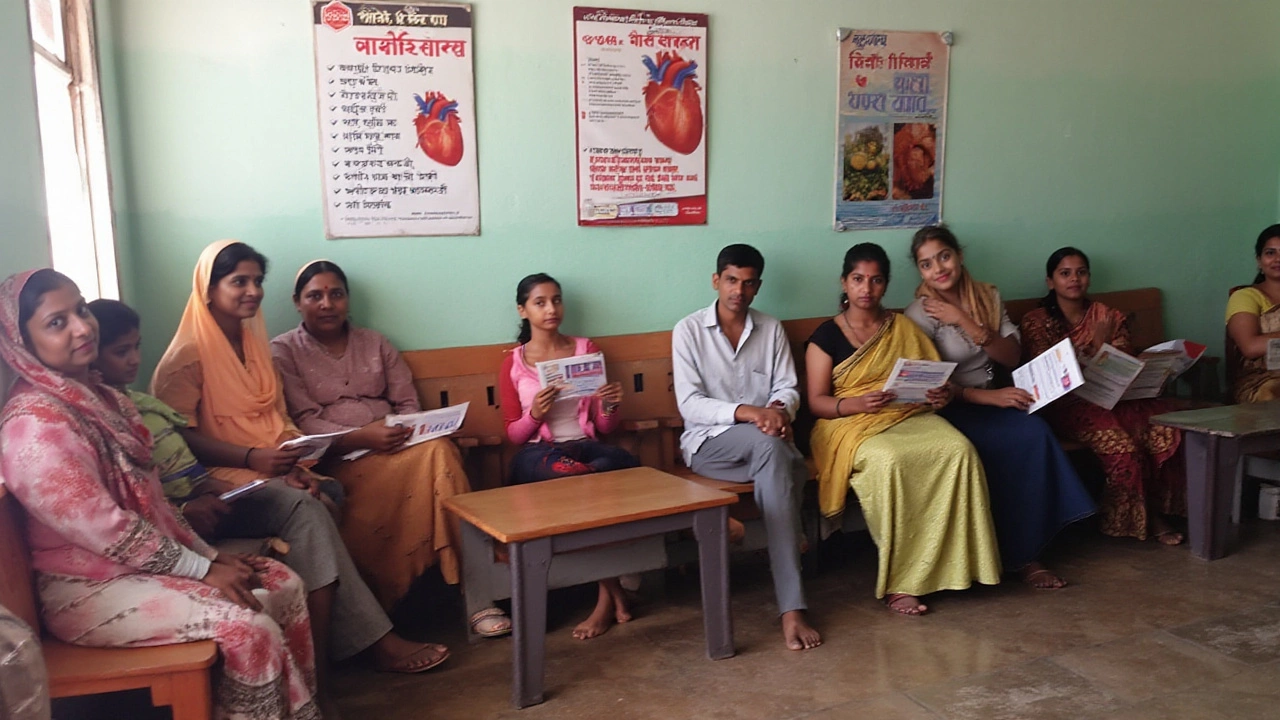
In today's fast-paced world, keeping a tab on one's health often takes a backseat. However, health checkups are an essential tool in preventive healthcare, designed to catch issues before they snowball into serious conditions.
These checkups typically involve a series of tests and screenings that aim to evaluate various aspects of your health. From blood tests that offer insights into your body's chemistry to screenings that assess the health of your heart and vital organs, understanding what these checkups entail can help you take charge of your well-being.
Whether you're considering a basic assessment or a more in-depth examination, knowing the essentials can guide you in selecting the most suitable package for your needs.
- Essential Tests and Screenings
- Specialized Exams for Different Ages
- Benefits of Regular Health Assessments
- Choosing the Right Package for You
Essential Tests and Screenings
When considering a health checkup, understanding the essential tests and screenings is crucial. Health checkups cover a wide gamut of examinations designed to evaluate your present health status and detect any underlying conditions. Generally, these tests can be categorized into blood tests, cardiovascular assessments, imaging studies, and lifestyle-related screenings. Blood tests are pivotal as they offer insights into your body's inner workings. Routine tests often include a Complete Blood Count (CBC), which gauges your immunity by examining the cells in your blood. Other significant tests such as lipid profile assess your heart health by measuring levels of cholesterol and triglycerides. For those with a family history of ailments like diabetes, a fasting glucose test can be indispensable.
Apart from blood tests, cardiovascular examinations play an integral role in evaluating heart health. An Electrocardiogram (ECG) offers a snapshot of heart functionality by tracing its electrical activity. Sometimes paired with an exercise or stress test, these tests help pinpoint any irregularities in heart rhythm. Imaging studies form another vital component of health checkups. Common imaging tests like chest X-rays and ultrasounds provide visual insights into vital organs. These images help identify anomalies such as tumors, infections, or structural changes in organs.
Lifestyle-related screenings are increasingly becoming a staple in comprehensive wellness exams. With modern sedentary lifestyles, screenings for obesity, bone density, and nutrition can help individuals manage risks more effectively. Body Mass Index (BMI) measurements, often part of these exams, help determine whether a person falls within healthy weight ranges. Stress levels and mental health assessments are also becoming standard, recognizing that mental well-being is integral to one’s overall health.
Engaging in regular checkups can vastly improve life quality by preemptively tackling issues. Data from a recent study revealed that people undergoing routine screenings had a 20% lower likelihood of suffering from stroke compared to those who did not. As Dr. Michael Smith, a renowned cardiologist, noted,
“The magic of regular health checkups lies not in detecting disease, but in knowing you’re living a healthy life.”Such statistics highlight the transformative power of proactive healthcare. Being well-informed about these tests means you can better collaborate with your healthcare provider, ensuring personalized care tailored to your needs.

Specialized Exams for Different Ages
As we journey through different phases of life, our health needs evolve with us. This calls for specialized health checkups tailored to each age group, ensuring that we receive the necessary care at the right time. In our 20s and 30s, the focus often lies on establishing a solid baseline for future health. General health screenings, including blood pressure and cholesterol checks, are crucial during these years. Alongside, it's wise to monitor your mental well-being as stress levels may peak due to career and personal transitions.
Moving into your 40s, it's time to ramp up the scope of your checkups. This is when preventive screening for diabetes and thyroid function start to play a key role, acknowledging the body's changing metabolism and energy levels. For women, mammograms become an essential part of routine checks, while men might opt for prostate health screenings as recommended by their healthcare provider. Regular eye exams also make their way onto the list, keeping your vision sharp, especially if you've been hooked to screens for most of your working life.
"Preventive care is the best form of care, especially as we age," notes Dr. Sarah Johnson, a leading preventive medicine specialist. "By addressing potential risks early, we can significantly enhance not just lifespan but health span."
As the golden years approach, health assessments take on a more comprehensive form. Screenings for heart disease become more frequent, and osteoporosis evaluations come into play, particularly for postmenopausal women and senior men. Additionally, keeping tabs on your cognitive health through memory tests can provide early detection of cognitive decline, enabling proactive management. Hearing evaluations might also be added to the list, ensuring that all senses are at their best to enjoy life to the fullest. Vaccinations become crucial as well, like the annual flu shot and others that protect against pneumonia and shingles.
Different healthcare facilities offer varied packages, often with a plethora of tests. It helps to discuss with your healthcare provider what components are necessary for your specific age, lifestyle, and genetic predispositions. Tailoring your medical tests to these variables not only maximizes their benefit but also turns the process into a journey of self-discovery and growth. Remember, investing in regular preventive care doesn't just keep illness at bay; it actively promotes a state of well-being that enriches every aspect of life. Making sure you have the right plan is as vital as the tests themselves, and understanding these milestones can empower you to make informed decisions about your health.

Benefits of Regular Health Assessments
Regular health checkups play an instrumental role in maintaining our well-being. By engaging in these assessments, individuals can catch potential health issues early before they develop into serious conditions. This proactive approach often proves to be a lifesaver, especially when it comes to chronic conditions such as hypertension, diabetes, and heart disease. The beauty of regular assessments lies in their ability to provide a baseline of your health, allowing healthcare providers to detect even the slightest abnormalities over time.
Aside from disease prevention, these medical tests offer a unique opportunity to build a relationship with your healthcare provider. During routine visits, doctors become familiar with your health history and lifestyle factors that might increase your risk for certain conditions. This intimate knowledge enables more personalized and efficient care, enhancing the overall healthcare experience and ensuring a higher standard of medical attention.
According to the Centers for Disease Control and Prevention (CDC), "Preventive healthcare, including regular checkups, is key to increasing the length and quality of life". This statement underscores the significance of staying ahead of potential health issues by facilitating early detection and intervention strategies.Moreover, preventive care often leads to cost savings in the long run. Treating advanced diseases can become complex and expensive, whereas identifying ailments in their nascent stages can significantly reduce associated healthcare expenses. This rationale alone serves as a compelling reason to prioritize regular checkups, especially for individuals with a family history of hereditary diseases.
It's worthwhile to mention that these assessments can also empower individuals by making them more mindful of their health choices. Armed with data from comprehensive assessments, individuals gain insights into their dietary habits, exercise regimes, and other lifestyle choices – information that can lead to positive changes. This empowerment manifests as an improved quality of life, as individuals actively participate in their preventive care, taking steps to bolster their health and well-being.
In addition to personal benefits, society as a whole thrives when preventive care is prioritized. Reduced community disease burdens translate into fewer missed workdays, lower healthcare costs, and improved public health outcomes. This ripple effect illustrates how individual actions can contribute towards fostering a healthier society. It's about embracing a philosophy where health is cherished, not only at an individual level but also through communal well-being.

Choosing the Right Package for You
Deciding on the perfect health checkup package can feel like navigating a complex labyrinth. With an array of options catering to different needs, it may seem daunting at first. However, understanding your personal health goals and specific requirements can make this task less intimidating. Whether your focus is on preventing major illnesses or just gaining peace of mind, selecting the right package involves assessing multiple factors such as age, lifestyle, medical history, and even the recommendations from your healthcare provider.
It's crucial to first determine what you want from these health checkups. Are you interested in a basic checkup to monitor blood sugar and cholesterol, or do you need a more comprehensive assessment that includes cardiac stress tests, cancer screenings, and evaluations for vitamin deficiencies? Different packages are designed with varying depths of examination, and identifying your needs will act as a significant filter in narrowing down your choices.
Considering Specific Tests
Understanding the tests involved is another vital step. For instance, some packages may include advanced imaging like MRIs or CT scans, which can reveal conditions unnoticed by standard tests. Preventive care should also be a priority—packages with regular assessments of heart health, like ECGs and blood pressure monitoring, are key. As per a study by the American Heart Association, regular heart screenings can reduce mortality rates by up to 25%, underlining the importance of such inclusions.Be mindful of age-specific concerns. For example, women over 40 might consider packages that emphasize mammograms and bone density tests, while men might focus on prostate and colon health assessments. An inclusive package catering to age-related risks can provide a holistic outlook on health, ensuring that you stay one step ahead of potential issues.
"Choosing a health checkup package is similar to crafting a diet plan. One size doesn't fit all. Always customize it based on the individual’s nutritional needs," explains Dr. Harrington, a renowned preventive medicine specialist, emphasizing the personalized approach one should take.
Cost and Accessibility
Cost often plays a significant role in decision-making. It's beneficial to compare the prices of different packages while assessing the value derived from each one. Insurance coverage may also affect your choice, as some providers offer subsidies on specific packages. Investigating these options could lead to substantial savings without compromising on quality.Lastly, consider the convenience factor. Selecting a package from a healthcare provider with a reputable facility close to your location can make attending appointments less stressful. Accessibility, along with flexible scheduling, can ensure you adhere to these health checkups regularly, maximizing their benefits.
Ultimately, choosing the right health checkup package demands a balance of practicality, preventative care, and personalized health insight. With informed choices, these preventive measures can profoundly impact your long-term health and well-being, making the investment worthwhile.
Categories
Popular Articles

Apr 26 2025

Apr 12 2025



